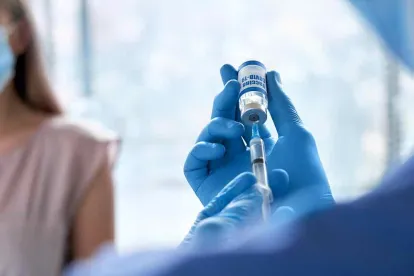By the time this article goes to print, it is likely that COVID-19 vaccine distribution and administration will be underway in the United States. In late October, the Trump Administration released an interim final regulation (IFR) that, among other things, provided rules from the Internal Revenue Service (IRS), Department of Labor (DOL), and Department of Health and Human Services (HHS) that apply directly to employer health plans and govern coverage of the COVID-19 vaccine under employer health plans. While employers can reasonably expect that group health plan insurers and third-party administrators will bear the lion’s share of getting employer health plans ready to cover the vaccine, employers should still be aware of the key provisions of the IFR that are relevant to employer health plan sponsors. Those looking for extra credit can find the full text of the IFR here.
Key Provision #1: All the rules described below apply with respect to “qualifying coronavirus preventive services.”
- Under the IFR, qualifying coronavirus preventive services include an item, service, or immunization that is intended to prevent or mitigate COVID-19 and that is, to put it in simple terms, designated as preventive care by the United States Preventive Services Task Force (USPSTF) or the Advisory Committee on Immunization Practices (ACIP) of the Centers for Disease Control.
Key Provision #2: Non-grandfathered employer health plans are required to cover qualifying coronavirus preventive services, including the COVID-19 vaccine, without cost-sharing no later than 15 business days from the vaccine’s designation as a preventive service.
- Normally, employer health plans have one year from the date that USPSTF or ACIP designates an item, service, or immunization as a preventive service to cover that item, service, or immunization. The IFR formalizes the accelerated 15 business day-timeline provided for under the CARES Act.
- Employer health plans also normally only have to cover immunizations that the applicable government agencies approve for regular use. The IFR overrides this normal rule and requires COVID-19 vaccine coverage, even if government agencies only initially approve the vaccine for urgent use.
- HHS issued a toolkit for plans and insurers and in that toolkit urges that insurers prepare to offer immediate coverage following the designation of the vaccine as preventive care.
- For purposes of the above rule, references to “non-grandfathered health plans” mean an employer health plan that is grandfathered from application of a number of Affordable Care Act (ACA) rules. If your company has a grandfathered health plan, you’ll know it.
Key Provision #3: Non-grandfathered employer health plans must cover the COVID-19 vaccine without cost-sharing, regardless of whether the plan member receives the vaccine in-network or out-of-network.
- Normally, non-grandfathered employer health plans are only required to offer coverage without cost-sharing for preventive care that a plan member receives from a provider that is “in-network” under the plan. The IFR requires employer health plans to cover the COVID-19 vaccine without cost-sharing regardless of whether the member received the vaccine through an in-network or out-of-network provider.
- In the IFR, the IRS, DOL, and HHS explain that this out-of-network coverage is necessary based on their belief that individuals may not always be able to locate network providers who can offer the vaccine and to facilitate full and widespread use of the COVID-19 vaccine.
- The IFR does limit what an employer health plan has to pay an out-of-network provider for a qualifying coronavirus preventive service to the amount that Medicare would pay for the service.
- Employer health plan coverage must include both the COVID-19 vaccine and its administration, regardless of how the provider bills the administration and regardless of whether the member receives a single or multiple dose vaccine.
- Finally, if the provider does not pay for the vaccine (because it receives the vaccine for free from the federal government), the employer plan does not have to pay the provider for the vaccine but does have to pay the provider for administering the vaccine.
The special rules described above will expire when the federal government declares an end to the COVID-19 public health emergency. This does not mean that employer health plans will no longer have to cover the COVID-19 vaccine at the end of the COVID-19 public health emergency (the “Emergency”); rather, it means the special exception to the routine use rule, 15-day accelerated coverage time frame, and the requirement to cover vaccines administered by an out-of-network provider will expire. While we wouldn’t dare to predict when the Emergency will end, considering its wide-spread significance in the employer plan arena (see our article here), we are confident that the end of that period and the resulting impact to employer plans will be big news.




 />i
/>i

